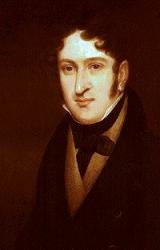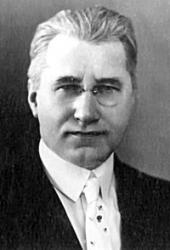Planning worship?
Check out our sister site, ZeteoSearch.org,
for 20+ additional resources related to your search.
- |
User Links
Person Results
Leendert Kooij
Translator of "There Rings Through the Clouds" in 50 Favorite Dutch Hymns
Leendert Kooij
William R. Featherston
1846 - 1873 Person Name: William R. Featherstone Author of "My Jesus, I Love Thee" in Favorites Number 3 William Ralph Featherston(e) Canada 1846-1873. Born at Montreal, Quebec, Canada, he joined the Wesleyan Methodist Church there. He became a Christian at age 16 while in Toronto, and is thought to have written his famous hymn about the same time. He sent the poem to his aunt, Ms. E. Featherston Wilson and she gave it to a publisher. Adoniram. J Gordon, an evangelist, founder of Gordon College & Gordon-Conwell Theological Seminary, found the hymn in a 1870 London hymnal and was impressed with the words, but did not like the tune, so he composed the melody that has been used with the hymn ever since. Featherstone is thought to have married Julie R MacAlister in 1869 and that they had a son, John, in 1870. Featherstone died in Montreal at age 26.
John Perry
William R. Featherston
A. B. Simpson

1843 - 1919 Person Name: A. B. S. Author (Chorus) of "My Jesus, I Love Thee" in Favorites Number 3 Albert B. Simpson was the founder of The Christian and Missionary Alliance.
Dianne Shapiro
A. B. Simpson
Anonymous
Person Name: Anon. Author of "Die wahre Heimat" in Evangeliums-Lieder 1 und 2 (Gospel Hymns) In some hymnals, the editors noted that a hymn's author is unknown to them, and so this artificial "person" entry is used to reflect that fact. Obviously, the hymns attributed to "Author Unknown" "Unknown" or "Anonymous" could have been written by many people over a span of many centuries.
Anonymous
Christoph Carl Ludwig von Pfeil
1712 - 1784 Person Name: v. Pfeil Author of "Wo findet die Seele die Heimat, die Ruh" in Gesangbuch für deutsche Gemeinden Pfeil, Christoph Carl Ludwig, Baron von, was born January 20, 1712, at Grünstadt, near Worms, where his father, Quirin Heinrich v. Pfeil, was then in the service of the Count of Leiningen. He matriculated at the University of Halle in 1728, as a student of law. After completing his course at the University of Tübingen, he was appointed, in 1732, Württemberg secretary of legation at Regensburg; then, in 1737, Justiz-und-Regierungsrath at Stuttgart; in 1745 Tutelar-raths-Präsident; in 1755 Kreisdirectorialgesandter to the Swabian Diet; in 1758 Geheim Legationsrath; and in 1759 Geheimrath. He found himself however at last no longer able to cooperate in carrying out the absolutism of the Württemberg prime minister Count Montmartin. When his resignation was accepted, April 13, 1763, he retired to the estate of Deufstetten, near Crailsheim, which he had purchased in 1761. In Sept., 1763, he was appointed by Frederick the Great as Geheimrath, and accredited Prussian minister or ambassador to the Diets of Swabia and Franconia. He was thereafter created Baron by the Emperor Joseph II., and in 1765 received the cross of the Red Eagle Order from Frederick the Great. An intermittent fever which developed itself in August, 1783, confined him to bed, where he remained till his death, at Deufstetten, Feb. 14, 1784 (Koch v. 176; Allgemeine Deutsche Biographie xxv. 646).
v. Pfeil was a man of deep and genuine piety. His hymnwriting began immediately after the spiritual change which he experienced on the 10th Sunday after Trinity, 1730; and it continued to be a favourite occupation, especially in his later years at Deufstetten. He was one of the most productive of German hymnwriters, his printed hymns being about 950, besides many in manuscript. The other hymns printed in his lifetime appeared in his (1) Lieder von der offenbarten Herrlichkeit und ZuJcunft des Herrn, Esslingen, 1741, 2nd ed. Memmingen, 1749, as Apocalyptische Lieder von der, &c. (2) Evangelisches Gesangbuch, Memmingen, 1782, with 264 hymns dating from 1730 to 1781, edited by J. G. Schellhorn. (3) Evangelische Glaubens-und Herzens-gesänge, Dinkelsbühl, 1783, with 340 hymns dating from 1763 to 1783. In recent times a number of his hymns have come into German use (they originally appeared, it must be remembered, during the Rationalistic Period), and Knapp includes 26 of them in his Evangelischer Lieder-Schatz, 1850. Two have passed into English, viz.:—
i. Am Grab der Christen singet man. Burial. Written in 1780. First published in No. 3, 1783, as above, p. 201, in 10 st., entitled, "We sing joyfully of Victory at the grave of the righteous: the right hand of the Lord hath gotten Him the victory." In the Berlin Geistliche Lieder,ed. 1863, No. 1433. Translated as, "The Christian's grave with joy we see," by Dr. G. Walker, 1860, p. 111.
ii. Wohl einem Haus, da Jesus Christ. Family Prayer. First published in No. 2, 1782, as above, No. 61, in 8 st. of 4 1., entitled, "Delightful picture of a house that serves the Lord. On the Parents of Jesus." It was apparently written for the 1st Sunday after Epiphany, 1746. In the Unverfälschter Liedersegen, 1851, No. 682. Translated as:—
Oh blest the house, whatever befall. A good translation omitting st. ii., vi., by Miss Winkworth, in her Chorale Book for England, 1863, No. 175. Including, omitting the trs. of st. iii., v.t and adding a translation of st. vi., as No. 344 in the Ohio Lutheran Hymnal, 1880. [Rev. James Mearns, M.A.]
-- John Julian, Dictionary of Hymnology (1907)
Christoph Carl Ludwig von Pfeil
Henry R. Bishop

1786 - 1855 Person Name: Henry Bishop Composer of "[Wo findet die Seele die Heimat, die Ruh?]" in Vierstimmige Melodien für das Gesangbuch Bishop, Henry Rowley, was born at London, Nov. 18, 1786, and died at London, April 30, 1855. See a full notice in the Dictionary of Nat. Biog., v., 91. From 1840 he was occasional and from 1843 to 1848 sole conductor of the Antient Concerts. Of his Twelve Corales...as sung at the Concerts of Ancient Music, for which (with Words expressly written to them) they were adapted and arranged by Sir Henry R. Bishop, 1844 (B. M. copy is H. 878), some are fairly literal translations from the German, others have no connection with their nominal originals. Three were noted in this Dictionary, but their source not having been traced in 1892, we now subjoin them:—
1. Behold, how glorious is yon sky, p. 127, ii. This is from "Wie herrlich ist die neue Welt" in C. H. Graun's oratorio Der Tod Jesu, 1756 (B. M. copy, 11. 1805, catalogued as 1766), the words being by Karl Wilhelm Ramler, b. Feb. 25, 1725, at Colberg, in Pomerania; 1748, Professor of Literature at the Cadet School in Berlin; d. at Berlin, April 11, 1798.
2. God is our Refuge in distress, Our Shield, p. 325, i.
3. O let us praise the Lord, With hearts of true devotion, p. 963, ii., No. 4. The Winchester Hymn Book, 1857, alters stanza i., the original line 1. 3, 4 being:—
"Whose spirit roams abroad,
To calm life's troubled ocean."
Another fairly close version is,"Wake, O wake! a voice is crying," from "Wachet auf," p. 805, ii. [Rev. James Mearns, M.A.]
--John Julian, Dictionary of Hymnology, New Supplement (1907)
Henry R. Bishop
William Kuipers

1883 - 1933 Person Name: Rev. Wm. Kuipers Translator of "I Hear in the Air" in The New Christian Hymnal Born: 1883, Rochester, New York.
Died: 1933, Passaic, New Jersey.
Buried: Restlawn Cemetery, Grand Rapids, Michigan.
Kuipers emigrated from Friesland to America, in the late 1880s, graduated from Calvin College, Grand Rapids, Michigan, and was ordained in the Christian Reformed Church. He served at the Second Christian Reformed Church of Fremont, Michigan (1914-19); Christian Reformed churches in Oakland, Michigan (1919-23); Dennis Avenue, Grand Rapids, Michigan (1923-27); and Summer Street, Passaic, New Jersey (1927-33). He wrote a number of poems, hymns, and psalm versifications.
© The Cyber Hymnal™ (hymntime.com/tch)
William Kuipers
Friedrich Ludwig Jörgens
1792 - 1842 Person Name: L. Jörgens Author of "Wo findet die Seele die Heimat der Ruh'?" in Evangeliums-Lieder 1 und 2 (Gospel Hymns) Also: Fronz Ludwig Jörgens or Friedrich Ludwig Jörgens
Friedrich Ludwig Jörgens
Herman H. Brueckner
1866 - 1942 Person Name: H. Brueckner Translator of "O Where Is The Home Of The Soul To Be Found" in American Lutheran Hymnal Born: March 11, 1866, Grundy County, Iowa (birth name: Herman Heinrich Moritz Brueckner).
Died: January 25, 1942, Hebron, Nebraska (funeral held in Beatrice, Nebraska).
Buried: St. Paul’s Lutheran Cemetery, Waverly, Iowa.
After ordination in 1888, Brueckner pastored in Illinois, Michigan, Kentucky, and Wisconsin. He later moved to Iowa City, Iowa, and received his Bachelor of Arts degree from Iowa State University in 1917. In 1926, he joined the faculty of Hebron College in Nebraska. In 1938, Wartburg Seminary, Dubuque, Iowa, conferred an honorary Doctor of Divinity degree on him. He retired as professor emeritus from Hebron College in 1941.
Sources:
Erickson, p. 254
Findagrave, accessed 14 Nov 2016
Hustad, p. 213
Stulken, p. 325
© The Cyber Hymnal™. Used by permission. (www.hymntime.com)
Herman H. Brueckner


 My Starred Hymns
My Starred Hymns


